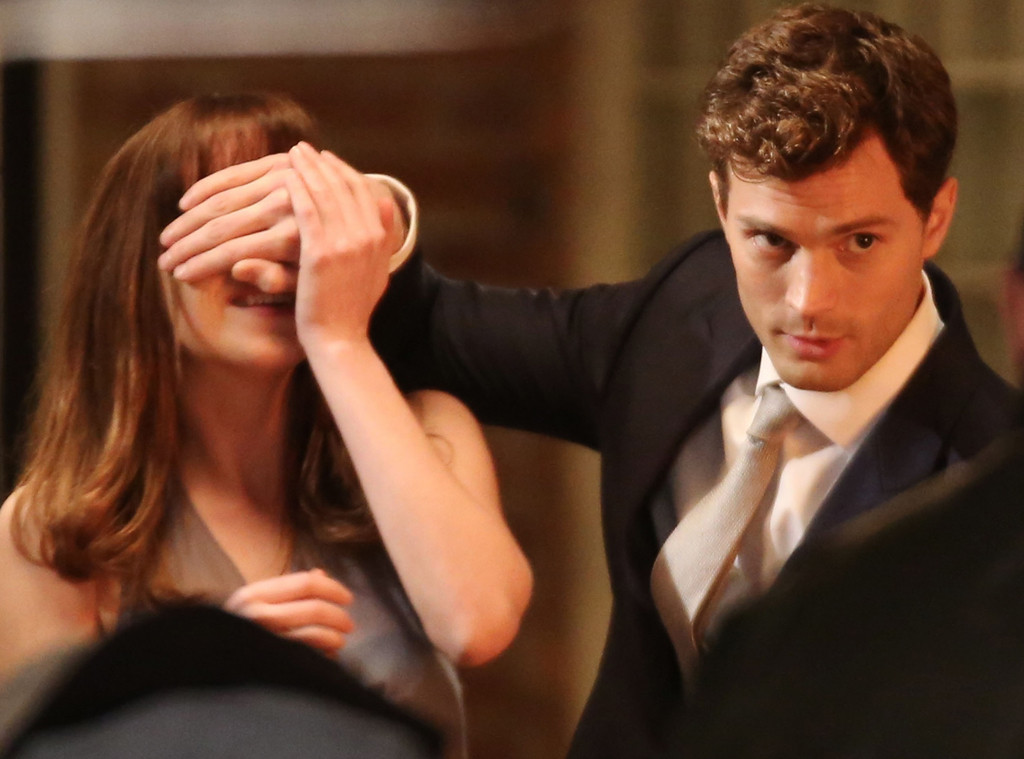Review: I Sat Through Fifty Shades of Grey, And Now I Thirst for Male Tears

There’s not much of a point in reviewing Fifty Shades (the movie) outside the context of Fifty Shades (the phenomenon). I don’t want to condemn what other people get their jollies from, and I think it’s remarkable that media has the power to change audiences’ perceptions of their own sexuality. Unfortunately, Fifty Shades conflates sexuality of any kind with agency; and as much as I’d like to think that everyone viewing or reading it does so with critical distance, that seems awfully optimistic when I remember how 19-year-old Carolyn didn’t think twice about Christian Grey’s patently abusive behavior, or when I consider how the little-Twilight-fanfic-that-could has created an unhealthy and inaccurate popular perception of kink.
Sure, there are people who enjoy aspects of Fifty Shades while also criticizing its glorification of domestic abuse; but there are also people who will pay $12,397 to get the “Christian Grey experience.” To recap: the Christian Grey experience depicted in the books and to some extent in the movie includes but is not limited to stalking, gaslighting, manipulation, forced alienation from one’s friends and family, and rape threats. None of those behaviors are part of BDSM. None of those behaviors are acceptable in a relationship. Fifty Shades (the movie) presents a less explicitly abusive dynamic than the first Fifty Shades book, but that’s in no way an endorsement of the film. If anything, that just makes its influence scarier.
Really I just wanted a pic of the shirt stuck on his head.
I’ve gotta hand it to Dakota Johnson, though–girl does a really good job of making something out of nothing. E.L. James’ Ana is basically just a placeholder, but Johnson is funny, warm, sympathetic, and smart (I can’t wait to see her in a more deserving movie). The book insinuated that Ana was a prude for hesitating to indulge her man’s “singular tastes,” but Johnson as an actor seems so obviously critical of the movie’s message that her reluctance actually makes Christian look a little bit like the unattractive jerk he is. If there’s one redeeming grace in Fifty Shades (the movie) that the book was lacking, it’s that Johnson’s surprisingly awesome performance allows the audience to look at Ana and see an actual woman. An actual woman whose boyfriend punishes her for visiting family. An actual woman who has her house broken into because she’s reluctant to sleep with a man. An actual woman guilted into thinking she has a duty to “fix” her abuser.
Jamie Dornan is fine. I guess. It’s hard to critique his performance when the character as written doesn’t do much aside from fume and wear the world’s lowest jeans. (Dornan’s core, however, is clearly vying for an Oscar. The man has a back like a bag full of snakes.) About that nudity: although the human cheesegrater stays safe in his magical floating pants for most of the film, Ana is naked more often than not; you could argue that’s illustrative of the pair’s sub/Dom relationship, but since, as Roxane Gay puts it, Fifty Shades is to BDSM as McDonald’s is to real food, it’s more likely that Ana’s physical exposure is just another indicator of the dangerous double standard upon which the entire franchise (and Twilight before it) is built.
Exhibit A
If Fifty Shades of Grey was about a woman who surprised her boyfriend-of-several-weeks by flying out to his parents’ house or breaking into his apartment, it wouldn’t have been made into a movie, or at least not one released on Valentine’s Day. A toxic woman is a scary or funny trope; men with the exact same behaviors are deemed “romantic.” The movie spouts a lot of fucked-up misinformation about BDSM (and for a movie that’s ostensibly pro-sex, it sure is obsessed with abstinence), but more than anything else, it’s a reminder of how easy it is to be a man.
Fifty Shades of Grey is so much smarter than its source material, but smarter in this case doesn’t mean better. Not where it counts, at least. The movie is savvy enough to know how to use E.L. James’ terrible prose as a comedic device, but just because the film wants its audience to recognize the ridiculousness of “laters, baby,” doesn’t mean that Christian himself is supposed to seem anything less than ideal. That’s where the scary potential of this adaptation lies: it initially presents itself as an ironic “so bad it’s good” experience, but when the shit hits the fan, it hits hard. Without any point of comparison, Ana’s abuse can seem like part of the joke, or worse, unremarkable.
There’s a scene near the beginning of the movie where Christian tells Ana he had no choice but to undress her while she was unconscious before putting her to bed. (Because sleeping in your street-clothes is deadly, I guess?!???) But he had a choice, and so do you. Don’t see this movie–not because it isn’t sexy, enjoyable, and fun, but because it’s business-as-usual misogyny in insidious, beefcake packaging. And because space bees. Nothing says Valentine’s Day like space bees, right?
Are you following The Mary Sue on Twitter, Facebook, Tumblr, Pinterest, & Google +?
Have a tip we should know? tips@themarysue.com